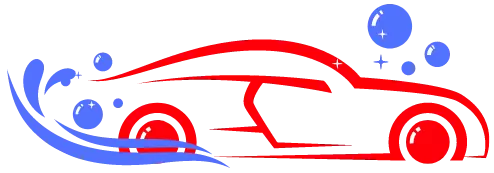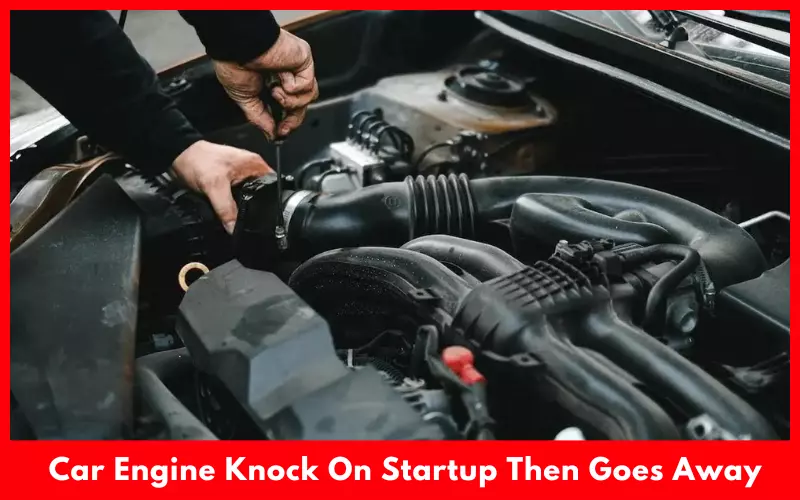Engine knocking is one of the common noises that the car makes during start-up due to age, wrong oil, faulty parts, or cold temperatures. So, if your car engine knock on startup then goes away, you have to consider plenty of things to fix the problem.
In the first attempt, make sure you are using high-quality engine oil with the right viscosity based on your car’s recommendation and outside temperature. If the problem persists, you may need to repair or replace a damaged bearing, loose or damaged timing chain, bad valve lifter, lost piston, or piston slap.
Article Summary
Why Does My Car Engine Knock on Startup Then Go Away?
Your car’s engine can knock on start-up and then go away after starting the engine due to plenty of internal parts that may get loose, stuck, damaged, or cracked. Let’s describe some most possible reasons:
1. Fail Bearing
There is a certain clearance between the rod and the main bearing that engine oil fills to lubricate the moving parts. When the bearing goes bad, it increases the clearance excessively and starts knocking until the oil pressure starts the engine. It’s a very dangerous problem as oil can’t handle too big gap and it may end up breaking something.
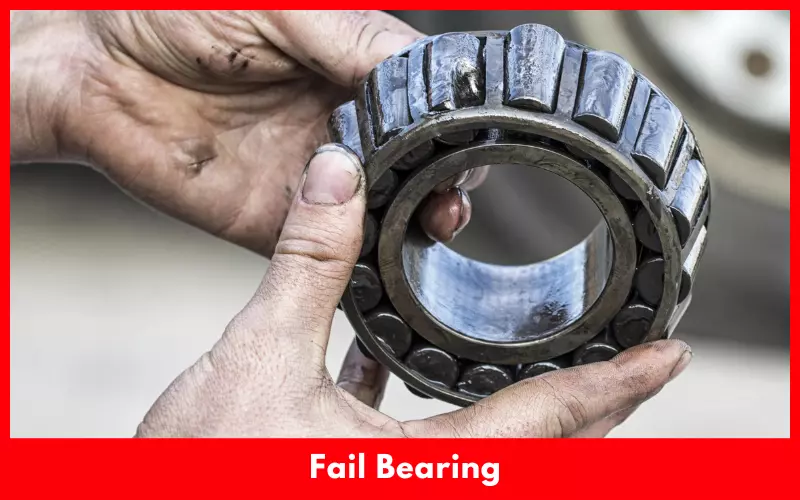
If the bad bearing is a source of the issue, you will only hear the knocking sound while revving the car, and will go away once start driving the car. The car wont also shake and active check engine light. But if the catastrophic bottom brews due to the failed bearing, you have to rebuild or replace the engine.
2. Timing Chain Problems
Timing chains maintain complex routing and remain concealed under the timing covers. If the timing chain stretches, it can cause a knocking or rattling noise during the start of the engine. If the engine rattles at a time, it can end up causing the failure of the timing chain tensioner, a cracked timing chain, and the engine completely.
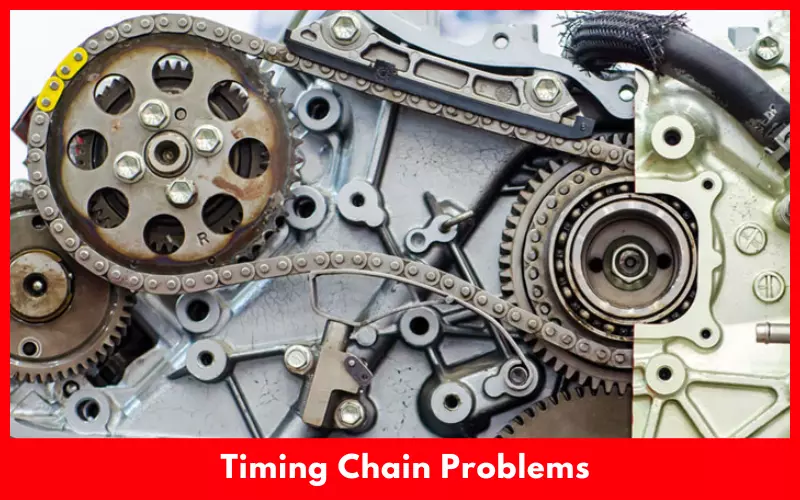
If your Subaru car engine knocks on start-up and then goes away, it can be a result of a hydraulic chain tensioner problem. During starting the engine, particularly for the first time, its oil pump pressurizes the tensioner. It may make a knocking noise.
3. Collapsed Hydraulic Valve Lifters
If your car engine knocks like making a tapping, loud clicking or helicopter sound and goes away after 20 to 30 seconds, it can be a result of collapsed hydraulic lifter. The valve train hydraulic lifter can collapse due to worn or leaked lifter bodies.
It indicates that the engine is near the end of its life. Hydraulic valve lifters may also make a clicking noise if the oil pump pressure reaches the lifter pressure to its top operating level.
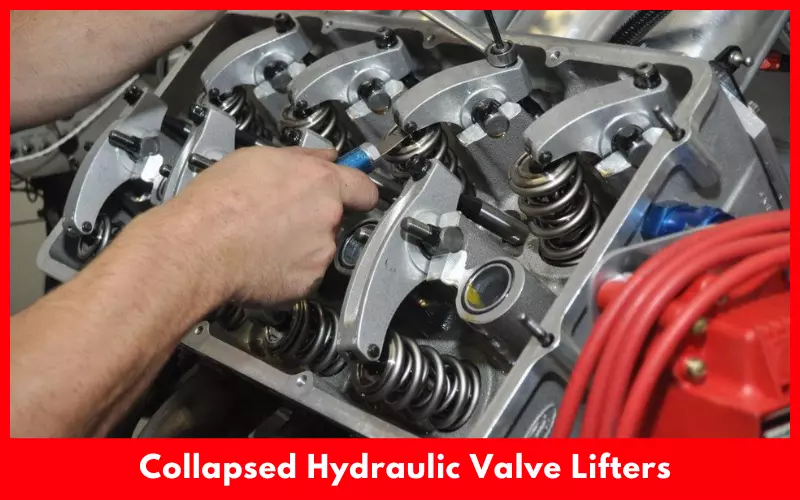
But if your car engine makes a single knock-on start-up and goes away, a sticky valve lifter can be responsible. The valve lifter can get sticky due to using dirty or wrong oil, a damaged oil filter, or faulty oil pumping.
4. Damaged Anti-Drain Valve
The anti-drain valve of the oil filter prevents the filter’s oil from draining into the oil pan during turning off the engine. But a damaged valve can allow the oil to drain into the oil pan. If so, during starting the engine, the pump tries to refill the filter before the oil reaches the rod bearings. It can make knocking noise.
5. Too Lose Piston
A loose piston can rattle around the bore and may make a knocking noise due tan o an excessively worn-out cylinder. If your vehicle has an aluminum alloy engine fitted with cast eutectic pistons, you may also hear a knocking noise for around 5 seconds during engine start-up.
It’s normal for such an engine, particularly for colder months. The knocking noise will go away once the engine warms up or oil gets up onto the piston skirts.
6. Piston Slap
When the cylinder wall and piston don’t have tight tolerances and the piston rocks side to side rather than up and down motion inside the cylinder, a piston slap occurs. After a while, the knocking sound goes away as the piston smooths out and gets cleaner grooves.
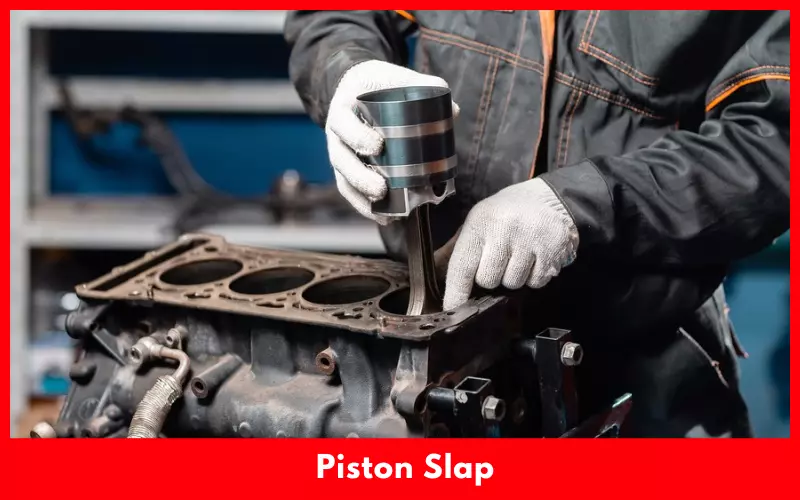
Piston slap can happen due to old age, internal rust and wear in the engine on a vehicle particularly that run over 120,000 to 150,000 miles. Low oil levels can also cause piston slap. If so, refilling the oil can fix the problem.
7. Dirty Fuel Injector
Fuel injectors shoot the engine’s fuel from the fuel rail. But if the fuel injector doesn’t fire accurately at the right time during starting the engine, the connected cylinder will chum without burning the fuel. In this case, you can hear excessive noise that will go away once fuel enters the engine.
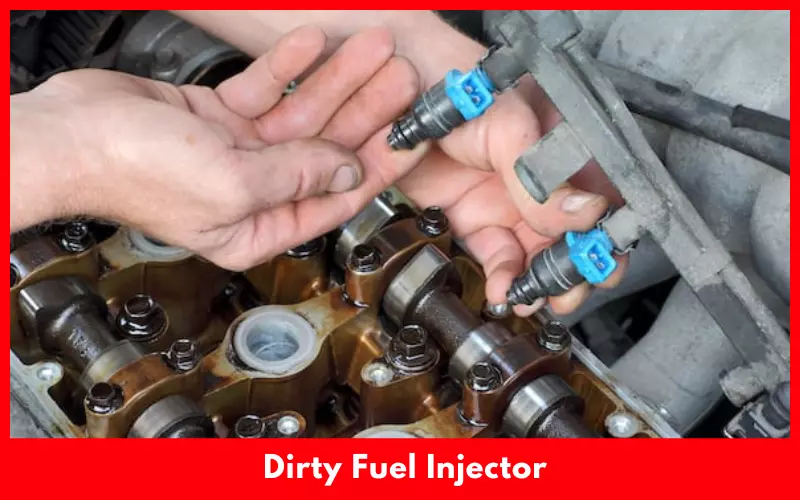
You may hear a single knocking noise due to a faulty fuel injector. Which is normal for older vehicles. To solve the problem, wash the fuel railing thoroughly or replace the fuel injectors.
8. Oil Drain Back
The engine valve keeps opening and closing to ensure continuous oil flow throughout the engine. But if the valve gets loose or fails, oil can flow back temporarily and cause drain back and create engine knocking.
However, the noise will go away after running the engine. the oil drain back can also cause engine misfire and is common for older cars that were built before 1980. To avoid this issue, you can install the drain back protection in the engine.
Can You Drive A Car with A Knocking Engine?
Yes, you can drive a car that makes a knocking noise on start-up for a whole. If the noise goes away after a few seconds, the vehicle is in optimal condition and you don’t experience any issues during driving, your car is safe to drive.
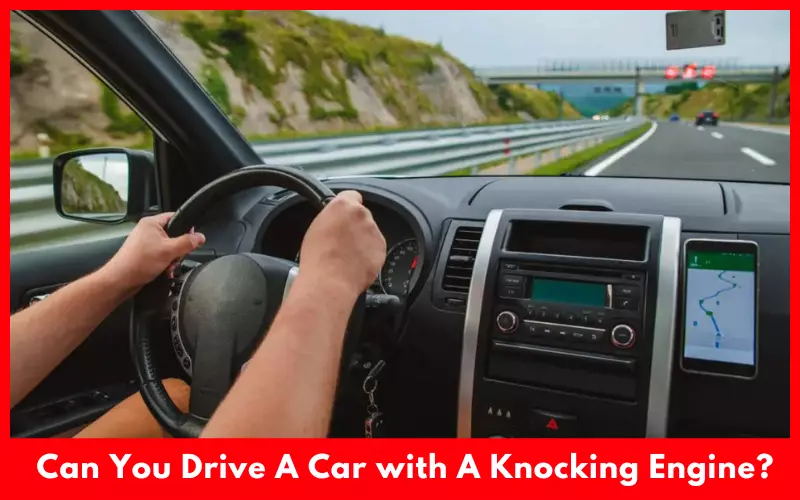
But if you lose steering power or struggle to accelerate, call an expert mechanic instead of driving the car. Ignoring the knocking noise for longer can also cause plenty of consequences. For example, the knocking noise can become louder and make it irritating to drive the vehicle.
The car’s speed may also reduce dramatically. You shouldn’t also drive the car with a knocking engine if the knocking noise triggers check engine light. Check engine light indicates a serious internal issue.
Why Does A Diesel Engine Knock on A Cold Start Then Go Away?
Diesel engines can knock loudly on cold start-up due to worn-out engine mounts. A worn-out hydraulic engine mount can leak oil and during a cold start, it can allow the engine to knock around for up to three minutes. But once the engine becomes warm, the knocking noise goes away as the engine builds more pressure to absorb the shock.
The viscous rubber may also cause the same consequences as it becomes hard as rock in a cold engine and transfers the motor’s vibration to the vehicle during start-up. When the engine becomes warm, the rubber also becomes pliable and absorbs motor vibration.
The autoignition delay may also be responsible as it causes pressure waves to hit the head, piston, and cylinder walls and make knocking noise. You can prevent this by increasing the cetane and letting it ignite the fuel easily to reduce cold start clatter.
Your diesel engine may also not pump the two-stroke oil properly until the fuel pump becomes hot. If so, the fuel starvation can make a knocking noise. If your car makes a knocking noise due to any of these reasons, take it to the auto repair shop to repair or replace the faulty parts.
FAQs
Is Cold Engine Knocking Normal?
Yes. hearing an engine knocking sound on the cold engine is normal and isn’t very concerning. In a cold engine, oil can’t move through the oil passages properly and causes the bearing to run without or with a little oil for a few minutes. Use 10-30 or 10-40 oil during winter or in a cold area to avoid cold engine knocking problems.
Should I Replace The Engine if I Heard A Knocking Noise?
You shouldn’t replace the engine first due to hearing knocking noise as the problem or faulty part can be repairable. For example, loose valve train parts, harmonic balancers, or timing tensioners are easier to repair or replace. Even replacing rod bearings or crank bearings is cheaper than replacing the whole engine.
Why Does My Car’s Engine Rattle On Startup And Then Go Away?
If your car engine rattles for around 2 to 5 seconds and then goes away, it can be the result of a bad timing chain tensioner. But if the rattle comes and goes quickly, a loose exhaust system heat shield can be responsible. If the engine power reduce and rattles continuously at idle, check the water pump pulley bolts. The other potential reasons are a damaged alternator, loose suspension components, and low oil level.
Final Words
Hearing engine noise on start-up isn’t always an issue, particularly in ulcer vehicles with wear-out parts. So after driving around 150,00 miles, you may hear a little bit of noise while starting the engine.
However, the knocking noise is different and concerning if triggers the check engine light. So if the knocking noise becomes louder day by day, inspect it by a professional mechanic before the engine becomes unusable. If the temperature or cold engine is responsible, use high-quality oil with perfect viscosity.
